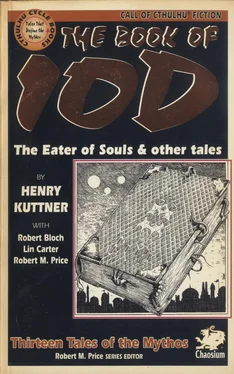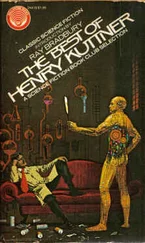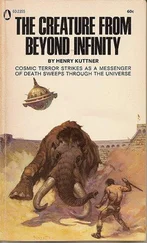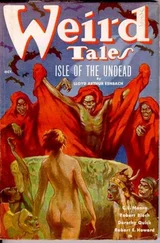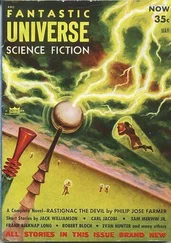Henry Kuttner - The Book of Iod
Здесь есть возможность читать онлайн «Henry Kuttner - The Book of Iod» весь текст электронной книги совершенно бесплатно (целиком полную версию без сокращений). В некоторых случаях можно слушать аудио, скачать через торрент в формате fb2 и присутствует краткое содержание. Год выпуска: 1995, ISBN: 1995, Издательство: Chaosium, Жанр: Ужасы и Мистика, на английском языке. Описание произведения, (предисловие) а так же отзывы посетителей доступны на портале библиотеки ЛибКат.
- Название:The Book of Iod
- Автор:
- Издательство:Chaosium
- Жанр:
- Год:1995
- ISBN:9781568820453
- Рейтинг книги:5 / 5. Голосов: 1
-
Избранное:Добавить в избранное
- Отзывы:
-
Ваша оценка:
- 100
- 1
- 2
- 3
- 4
- 5
The Book of Iod: краткое содержание, описание и аннотация
Предлагаем к чтению аннотацию, описание, краткое содержание или предисловие (зависит от того, что написал сам автор книги «The Book of Iod»). Если вы не нашли необходимую информацию о книге — напишите в комментариях, мы постараемся отыскать её.
The Book of Iod — читать онлайн бесплатно полную книгу (весь текст) целиком
Ниже представлен текст книги, разбитый по страницам. Система сохранения места последней прочитанной страницы, позволяет с удобством читать онлайн бесплатно книгу «The Book of Iod», без необходимости каждый раз заново искать на чём Вы остановились. Поставьте закладку, и сможете в любой момент перейти на страницу, на которой закончили чтение.
Интервал:
Закладка:
Then the god withdrew, and the shadow lifted. Again Droom- avista sank into his dreaming sleep, weaving intricate cosmogonies; and speedily he forgot Thorazor. But the sorcerer stood in his chamber, trembling with exultation, for at his feet lay a jewel. This had the god left behind.
Flaming, blazing, streaming with weird fire the gem illuminated the dark chamber, driving the shadows back into the distant corners. Yet Thorazor had not eyes for its beauty; this was the Philosopher’s Stone, this the Elixir! A glory was in the wizard’s eyes as he prepared a brew as Droom-avista had commanded.
Then the mixture seethed and bubbled in the golden crucible, and over it Thorazor held the shining jewel. The culmination of a lifetime’s hopes was reached as he dropped the gem into the frothing brew.
For a heartbeat nothing happened. Then, slowly at first, but with increasing swiftness, the golden crucible changed in color, slowly darkening. Thorazor cried out, blessing Droom-avista, for the crucible was no longer golden. It had been transmuted, by the power of the jewel, into the rarest of metals.
The gem, as though lighter than the bubbling mixture, lay lightly on the liquid surface. But the metamorphosis was not yet complete. The darkness crept down the pedestal that supported the crucible; it spread out like a fungoid stain across the onyx floor. It reached the feet of Thorazor, and the sorcerer stood frozen, glaring down at the frightful transmutation that was changing his body from flesh and blood into solid metal. And in a flash of blinding realization Thorazor knew Droom-avista’s jest, and knew that by the power of the Elixir all things are changed to the rarest of elements.
He shrieked once, and then his throat was no longer flesh. And slowly, slowly, the stain spread across the floor and up the stone walls of the chamber. The shining onyx dulled and lost its sheen. And the hungry stain crept out through the Black Minaret, out upon Bel Yarnak, while the thin voices cried sadly in the marble streets.
Woe, woe unto Bel Yarnak! Fallen is the glory, dulled and tarnished the gold and silver splendor, cold and lifeless the beauty of the magic citadel. For outward and ever outward crept the stain, and in its path all was changed. The people of Bel Yarnak no longer move light-heartedly about their houses; lifeless images throng the streets and palaces. Immovable and silent sits the Sindara on a tarnished throne; dark and grim looms the city under the hurtling moons. It is Dis; it is the damned city, and sad voices in the silent metropolis mourn for lost glory.
Fallen is Bel Yarnak! Changed by the magic of Thorazor and by Droom-avista’s jest, changed to the rarest of all elements in the planet of gold and silver and shining gems.
No longer Bel Yarnak—it is Dis, the City of Iron!
Spawn of Dagon by Henry Kuttner
Under all graves they murmur,
They murmur and rebel,
Down to the buried kingdoms creep,
And like a lost rain roar and weep
O’er the red heavens of hell.
Will Murray has characterized Henry Kuttner as the quintessential pulp writer: He could write stories in any genre, fast, and on demand. When Robert E. Howard plunged into the River Styx, Kuttner sought to carry on in the tradition of Conan the Cimmerian and penned a small but valuable canon of the adventures of Prince Raynor and the hero of the present tale, Elak of Atlantis. Gary Lovisi (of Gryphon Books, P.O. Box 209, Brooklyn NY 11228) had collected the two series in a pair of small press books. You may also find them, if you look hard enough, in several old paperback anthologies: “Spawn of Dagon” itself in Leo Margulies (ed.), The Ghoul Keepers, Pyramid, 1961; Lin Carter (ed.), The Magic of Atlantis, Lancer, 1970; and Sean Richards (ed), The Barbarian Swordsmen, Star, 1981; “Dragon Moon” in L. Sprague de Camp (ed.), The Fantastic Swordsmen, Pyramid, 1967; Hans Stefan Santesson (ed.), The Mighty Barbarians, Lancer, 1969; “Thunder in the Dawn” in De Camp (ed.), Warlocks and Warriors, Berkley, 1970; “Beyond the Phoenix” in Peter Haining (ed.), Weird Tales, Vol. 1, Sphere, 1978; “Cursed Be the City” in Lin Carter (ed.), The Young Magicians, Ballantine, 1969; “The Citadel of Darkness” in De Camp (ed.), Swords and Sorcery, Pyramid, 1963- Carter always maintained that Kuttner beat Howard at his own game in these tales. Certainly “Spawn of Dagon” has at least a little in common with Howard’s “Rogues in the House” (and, come to think of it, so does Carter’s own “Thieves of Zangabal”!). You may be the judge as to which is the better.
“Dagon”, of course, is no Lovecraftian coinage. HPL borrowed it from the Philistine deity of the Bible. There is evidence that Dagon was pictured as a semi-ichthyic merman, and Brian Lumley reinforces this possibility by pointing out the association of Dagon with Oannes the fish god. So it might be that Kuttner is here making his own independent use of the same deity. But it is hard to miss a Lovecraftian coloring to the idea of Dagon as a fish god with an ichthyic race of servitors seeking to sink all the surface continents in order to regain their primordial hegemony.
It is worth a moment’s pause to exegete an in-joke in the story. Elak happens to overhear the musings of the sorcerer Zend: “I now summon…a new soul to serve me. When her soul is freed, I shall send it to Antares. There is a planet there where I have heard much sorcery exists. Mayhap I can learn a few more secrets. ” Surely the reference here is to Edmond Hamilton’s “Kaldar, World of Antares” (The Magic Carpet, April 1933, reprinted in Don Wollheim’s Ace anthology Swordsmen in the Sky J. Hamilton himself recalled that when Kuttner was in high school he had written a fan letter to Weird Tales “that I was his favorite author” (in Robert Weinberg, The Weird Tales Story, FAX Collector’s Editions, 1977, p. 53)
First publication: Weird Tales, July 1938.
Two streams of blood trickled slowly across the rough boards of the floor. One of them emerged from a gaping wound in the throat of a prostrate, armor-clad body; the other dripped from a chink in the battered cuirass, and the swaying light of a hanging lamp cast grotesque shadows over the corpse and the two men who crouched on their hams watching it. They were both very drunk. One of them, a tall, extremely slender man whose bronzed body seemed boneless, so supple was it, murmured:
“I win, Lycon. The blood wavers strangely, but the stream I spilt will reach this crack first.” He indicated a space between two planks with the point of his rapier.
Lycon’s child-like eyes widened in astonishment. He was short, thick-set, with a remarkably simian face set atop his broad shoulders. He swayed slightly as he gasped, “By Ishtar! The blood runs up-hill!”
Elak, the slender man, chuckled. “After all the mead you swilled the ocean might run up-hill. Well, the wager’s won; I get the loot.” He got up and stepped over to the dead man. Swiftly he searched him, and suddenly muttered an explosive curse. “The swine’s as bare as a Bacchic vestal! He has no purse.”
Lycon smiled broadly and looked more than ever like an undersized hairless ape. “The gods watch over me,” he said in satisfaction.
“Of all the millions in Atlantis you had to pick a fight with a pauper,” Elak groaned: “Now we’ll have to flee San-Mu, as your quarrels have forced us to flee Poseidonia and Kornak. And the San-Mu mead is the best in the land. If you had to cause trouble, why not choose a fat usurer? We’d have been paid for our trouble, then, at least.”
“The gods watch over me,” Lycon reiterated, leaning forward and then rocking back, chuckling to himself. He leaned too far and fell on his nose, where he remained without moving. Something dropped from the bosom of his tunic and fell with a metallic sound to the oaken floor. Lycon snored.
Читать дальшеИнтервал:
Закладка:
Похожие книги на «The Book of Iod»
Представляем Вашему вниманию похожие книги на «The Book of Iod» списком для выбора. Мы отобрали схожую по названию и смыслу литературу в надежде предоставить читателям больше вариантов отыскать новые, интересные, ещё непрочитанные произведения.
Обсуждение, отзывы о книге «The Book of Iod» и просто собственные мнения читателей. Оставьте ваши комментарии, напишите, что Вы думаете о произведении, его смысле или главных героях. Укажите что конкретно понравилось, а что нет, и почему Вы так считаете.
